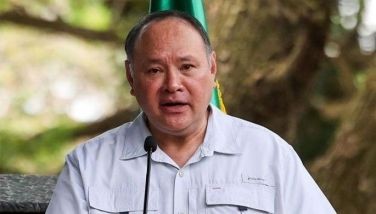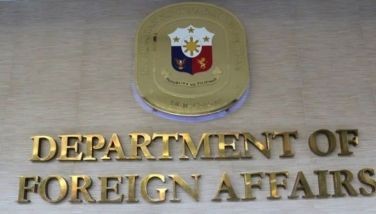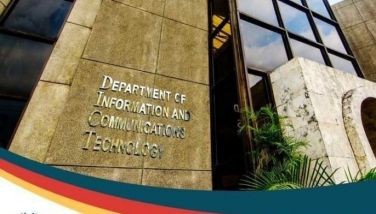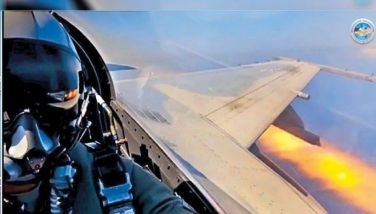Duterte threatens to put martial law critics in jail
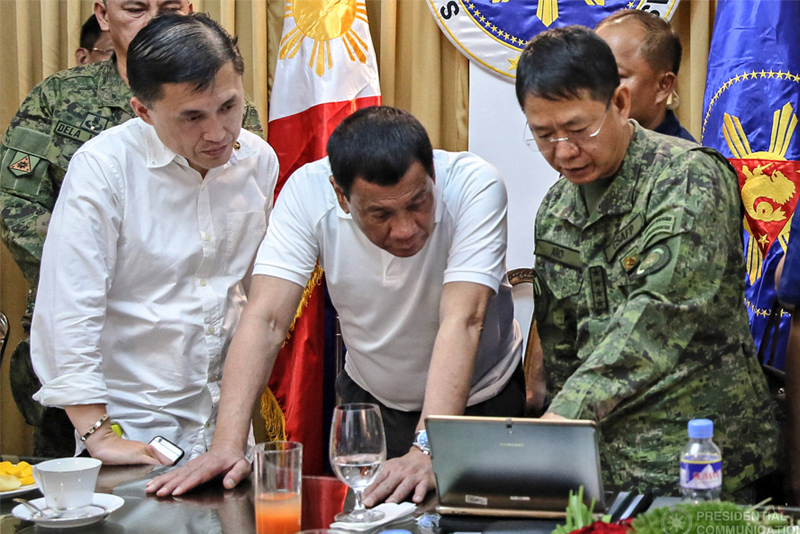
President Rodrigo Duterte said he would only lift military rule in Mindanao if the security forces tell him that people on the island are safe from threats. PPD/File
MANILA, Philippines - President Duterte has threatened to put behind bars those who insist on lifting martial law in Mindanao even if the Marawi City crisis remains unresolved.
Duterte said he would only lift military rule in Mindanao if the security forces tell him that people on the island are safe from threats.
“When is the time to lift the martial law? And then I will ask the military and the police, ‘is this safe now?’ And when the chief of staff and the PNP (Philippine National Police) would say ‘everybody would be safe and it’s OK now,’ I will lift it,” the President said in a speech in Digos City, Davao del Sur on Saturday.
“Otherwise, it’s not dependent on the whim na punta kang Supreme Court, maniwala kaya ako? Tingin ko magulo pa, ipa-lift mo? Huhulihin kita, ipasok na tuloy kita sa kulungan (that if you go to the Supreme Court, will I believe you? I think it is still unstable, you will ask the court to lift it? I will have you arrested and place you in jail),” he said.
Duterte did not say what cases would be filed against critics who would insist on lifting martial law.
While Duterte claimed that he imposed military rule to save the people of Mindanao from terrorists, his critics believe he has no sufficient basis to do so and questioned his move before the Supreme Court.
The President declared martial law in Mindanao last May 23 after Islamic State-aligned Maute terrorists raided Marawi City to protect Abu Sayyaf leader and wanted terrorist Isnilon Hapilon from government troops. A total of 317 Maute group members, 82 government troopers and 39 civilians have died since clashes erupted.
The military has been claiming that the Maute group is losing strength since the early days of the Marawi siege but has yet to fully reclaim the predominantly Muslim city.
Security officials no longer set deadlines for the operations against the terrorists after repeatedly failing to meet self-imposed targets. They also could not say when the martial law in Mindanao would be lifted but stressed that the decision hinged on the assessment of ground commanders.
Security officials have repeatedly claimed that there was enough basis to impose martial law in Mindanao, saying they got reports that the terrorists had tried to establish an Islamic State province in Marawi City. They also revealed that money from illicit drugs trade is funding the terrorists’ activities.
Duterte, who has apologized to Marawi residents for declaring martial law, stressed that he does not enjoy imposing military rule in Mindanao.
“You don’t like martial law? S***. So be it. You don’t like it? Fine… Why should I enjoy declaring martial law? For what? I won by six million (votes). So what’s the problem? And you know, you do these things in Marawi, terrorists killing, beheading Christians and Moro alike, those fools, I will not forgive them,” the President said.
“Huwag mong ipapasubo ng… lalo na ang bayan ko (Do not place my country in danger). We can talk of anything else and make compromises maybe, but not when the interest of my country is at stake... That is not negotiable,” he added.
Duterte admitted that he reads daily updates about the Marawi crisis “with a heavy heart.”
“I am with a heavy heart because by the time I reach home, the briefers for the day are there and the narratives are there,” the President said.
“I get to read the so many soldiers and police who are dying... I’m telling you the truth: every time I read it, it’s too unsettling. Sometimes I cry, my tears will just flow if the numbers are great,” he added.
Duterte said his only consolation was the fact that he had to do his duty to preserve and defend the Filipino people from security threats.
SC to resolve martial law legal issues tomorrow
Meanwhile, the SC is set resolve tomorrow the legal issues involving Duterte’s martial law declaration in Mindanao.
An insider bared that the three consolidated petitions seeking to strike down Proclamation No. 216, which were heard in three-day oral arguments last month, have been included in the agenda of the high court’s regular session.
Article VII, Section 18 of the Constitution gives the high court a 30-day deadline in resolving petitions against martial law proclamation.
The provision allows the SC to “review, in an appropriate proceeding filed by any citizen, the sufficiency of the factual basis of the proclamation of martial law or the suspension of the privilege of the writ or the extension thereof, and must promulgate its decision thereon within 30 days from its filing.”
The first of the three petitions was filed last June 5 by a group of opposition lawmakers led by Albay Rep. Edcel Lagman. Two similar petitions filed by local Mindanao leaders led by lumad leader Eufemia Campos Cullamat and a group of women from Marawi led by Norkaya Mohamad followed suit.
This means the SC has until July 5, Wednesday, to rule on the case.
The source said several justices have already submitted their opinions for deliberations and voting. The draft opinions, the insider hinted, showed differing positions on Duterte’s martial law and indicated a divided Court.
During oral arguments last June 13 to 15, petitioners asked the SC to void the martial law declaration and argued that there was no sufficient factual basis to justify martial law implementation as several information cited in the proclamation were “false, inaccurate and contrived.”
They further alleged that a key element in the act of rebellion – culpable purpose of removing allegiance from the Philippines and preventing the President and legislature from exercising their functions – was not present in the attack of local terror group Maute in Marawi City last May 23 that triggered martial law proclamation.
Solicitor General Jose Calida, on the other hand, defended the martial law declaration before the SC.
Not just terrorism
He said the attack of Maute was not just an act of terror, but clear rebellion and actually part of a plot to establish Islamic state in Mindanao.
Calida argued that elements of rebellion – raising arms against the government and culpable purpose of removing allegiance from the government – were present in the crisis that required the President to use his power of declaring martial law under the Constitution.
He cited linkages between Maute and other rebel groups in Mindanao like Bangsamoro Islamic Freedom Fighters and Abu Sayyaf.
Top martial law officials also appeared before the SC in a closed-door session to present the factual bases for Duterte’s declaration of martial law in Mindanao.
Defense Secretary Delfin Lorenzana, martial law administrator, and Armed Forces of the Philippines (AFP) chief of staff Gen. Eduardo Año, martial law implementor, presented confidential information to the justices to justify the need to declare martial law.
In its memorandum, the Office of the Solicitor General has listed 20 other terrorist groups in Mindanao with similar ties to Islamic State in Iraq and Syria that have launched attacks in Basilan, Sulu, Tawi-Tawi, Zamboanga and Davao. And their main objective is to remove the whole Mindanao from its allegiance to the Philippine government.
Calida also said that there were already 43 violent attacks by the terror cells consisting mostly of improvised explosive devices, harassment and kidnappings.
“As the survival of the State hangs in the balance, I implore the Honorable Supreme Court to sustain the constitutionality of Proclamation No. 216, and allow the President to perform his constitutional mandate of protecting the people,” he appealed.
The SC is also set to resolve two other consolidated petitions seeking to compel the Senate and the House of Representatives to convene jointly to review Duterte’s martial law declaration.
Calida has also asked the SC to junk the petitions filed by separate groups led by former senators Rene Saguisag and Wigberto Tañada for lack of merit.
Calida argued that Congress is not required to convene in joint session to support a martial law declaration under Article VII, Section 18 of the 1987 Constitution.
The provision states: “The Congress, voting jointly, by a vote of at least a majority of all its Members in regular or special session, may revoke such proclamation or suspension, which revocation shall not be set aside by the President. Upon the initiative of the President, the Congress may, in the same manner, extend such proclamation or suspension for a period to be determined by the Congress, if the invasion or rebellion shall persist and public safety requires it.”
In the existing jurisprudence on post-Marcos martial law, the SC considered martial law as a political decision when it ruled on former president Gloria Macapagal-Arroyo’s declaration of martial law after the Maguindanao massacre in 2009 was questioned before the tribunal.
In April 2012, the SC dismissed the seven petitions challenging the martial declaration only on the basis of being moot and academic because martial law was only effective for eight days following the massacre of 58 people in Maguindanao, mostly journalists, on Nov. 23, 2009 by the Ampatuan clan and their private army.
The high tribunal did not settle the constitutional issues raised in the petitions against Arroyo’s Proclamation No. 1959, the first case of a president declaring martial law since the dictatorship of Ferdinand Marcos. – With Edu Punay, AFP
- Latest
- Trending
















